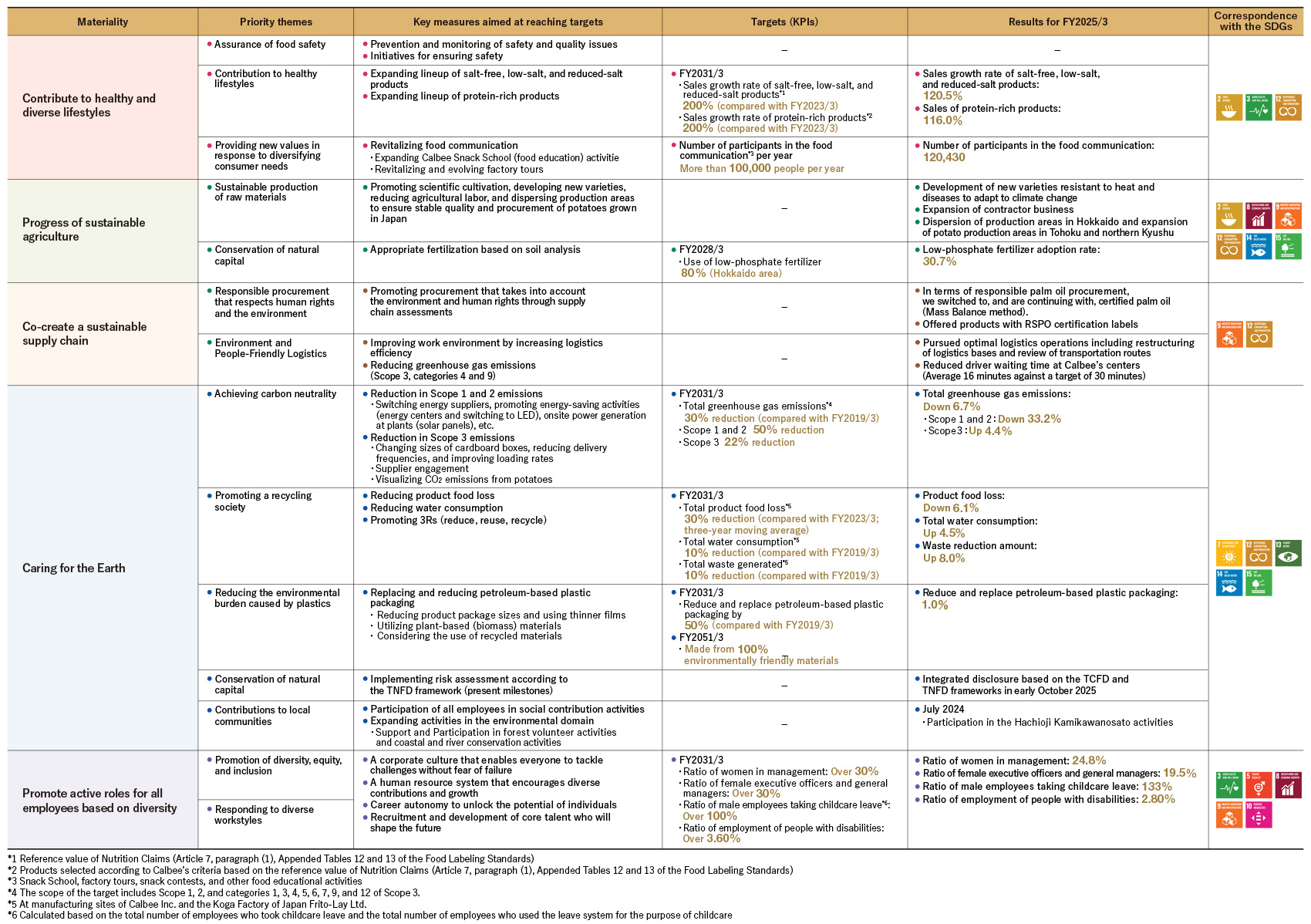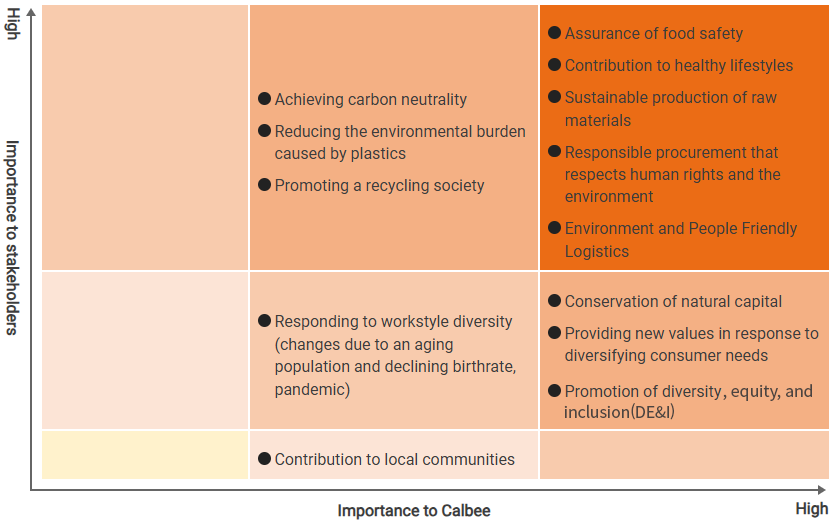Materiality
For the future
Our Five Material Issues
The Calbee Group is addressing priority themes identified based on materiality (key issues), which is the central strategy of its sustainability management.
We identified material issues from two aspects: importance to stakeholders and importance to our company, and set forth priority themes for each issue to clarify the social issues we need to address.
We established the Priority Theme Subcommittees, headed by senior officials, which draft and implement strategies for the respective priority theme.
It is necessary to update materiality on a regular basis to reflect the changing external environment.
In light of the growing importance of natural capital, climate change countermeasures, and the emergence of human rights issues, we reviewed our materiality in 2022 and are taking measures by once again specifying five material issues and 13 priority themes.
We aim to mitigate risks to management while identifying opportunities for innovation by prioritizing the allocation of internal resources to these themes, thereby achieving medium- to long-term growth.
-
Contribute to healthy and diverse lifestyles

Lifestyles and dietary habits have been diversifying owing to improvements in food safety and reliability, as well as increasing health awareness. Throughout the value chain, we will enhance our safe and reliable quality assurance system, contributing to improved lifestyles through measures such as food communication activities.
-
Progress of sustainable agriculture

For Calbee, which offers products made with the power generated by natural capital, the sustainability of agriculture is of utmost importance. We will promote cultivation technologies to enhance agricultural productivity and conserve natural capital, which is closely linked to agriculture.
-
Co-create a sustainable supply chain

The supply chain, spanning from raw material procurement to production, distribution, and sales, faces various risks, including climate change, human rights issues, and concerns about working conditions. The Calbee Group strives to ensure stable procurement of raw materials and logistics by improving the productivity of the supply chain through co-creation efforts with stakeholders.
-
Caring for the Earth

We aim to balance our business activities with the preservation of the rich natural environment by engaging in the conservation of natural capital, implementing measures to counter climate change, and promoting a recycling society. We also plan to address social issues such as sustaining a vibrant society and the rich natural environment in our regions and communities.
-
Promote active roles for all employees based on diversity

We believe that human resources are a key foundation supporting our value chain. The Calbee Group is evolving into an organization that leverages diversity, enabling all employees to thrive and generate innovation that supports the sustainable growth of the Group.
Priority Themes and Major Measures Based on Materiality

Materiality identification / review process

Internally review KPI progress
We conducted interviews with each of the subcommittees involved in the re-identification of materiality. We compiled a range of key issues, views and ideas from the subcommittee members, including general managers and staff members charged with tasks, and collated data based on various themes.

Analyze external evaluations
We examined the literature on changes in the external environment that may affect sustainability, so as to keep up to date with the latest developments. Then, we took into consideration the impact that the changes might have on the food industry, checked our findings against the data collected in Step 1, and identified social issues that are highly relevant to the Calbee Group.

Review the Materiality Map
In order to review the Materiality Map, we took into consideration the results of the analysis of external evaluations conducted in Step 2, and re-evaluated each of the social issues identified based on their importance to stakeholders and to Calbee, which are indicated on the vertical and horizontal axes, respectively,


Review materiality
We organized each of the social issues on the map and reviewed correlations between materiality and the external environment, identifying five new material issues and 13 key issues.

Review and finally identify measures and KPIs
We discussed key measures for new materiality and draft KPIs with the subcommittees that we interviewed and relevant departments. We also sought feedback and advice from external experts on the review process and the draft materiality in order to verify that they are appropriate.
The new materiality and draft KPIs were finally approved at the 7th meeting of the Sustainability Committee in December 2022, and we identified them as new materiality and have started to address them.
Review of the appropriateness of materiality by conducting interviews with external experts
We interviewed two experts to verify the re-identification of materiality from external perspectives.
We took their views into consideration when we re-identified materiality.

Japan Director, CSR Asia Ltd.
Ms. Makiko Akabane, who has abundant knowledge of CSR and the sustainability initiatives of both Japanese and foreign companies, gave us feedback and advice to help us practice globally applicable sustainability management.
-
●Food manufacturers with overseas operations are expected to give consideration to small farmers in the ingredient procurement process, guarantee wages for their factory workers, and deal with the issue of plastic packaging materials. They are under intense public scrutiny.
-
●Foreign companies seem to be more interested in setting ambitious targets than in disclosing their KPIs. Many of them write mission statements like: “This is the kind of company we are and this is the kind of society we want to create. That’s why we are doing this.” The difference between Japanese companies and foreign companies is that the latter tend not to focus on KPIs or the PDCA cycle, as is common practice in Japan. When you disclose information and communicate with audiences on English language media, you should pay careful attention to how to express yourself in the English language.
-
●Animal welfare will be an increasingly important concern. You are not required to include animal welfare among your material issues when you disclose materiality, but nevertheless, it would be better if you could mention that you have started internal discussions on animal welfare when you disclose your review process.

Professor, Rikkyo University
Professor Kawaguchi, who has a high level of expertise in all aspects of sustainability, gave us feedback and advice on changes in the external environment that have an impact on the Calbee Group and stakeholders’ expectations.
-
●There is a high level of need for plastic alternatives in our society today, and people may have the impression that the Calbee Group is not doing enough compared to other leading food manufacturers. I think you should clearly indicate your efforts to reduce plastic use as one of your material issues and priority themes.
-
●Here’s what you could do: place your efforts to protect natural capital at the beginning of your narrative when you mention the relationship between sustainable agricultural production, which is an ongoing material issue, and the protection of natural capital, which is a new theme. Highlight keywords, such as “nature’s gifts,” which are part of the corporate philosophy that you embrace and follow. And write a story about Calbee’s co-creation with farmers even if you cannot make Calbee the subject of a sentence. I think these things are important.
-
●Animal welfare is an issue that you should be prepared to address, although you do not need to categorize it under the materiality heading. Animal welfare, egg production in particular, is likely to come under scrutiny.
